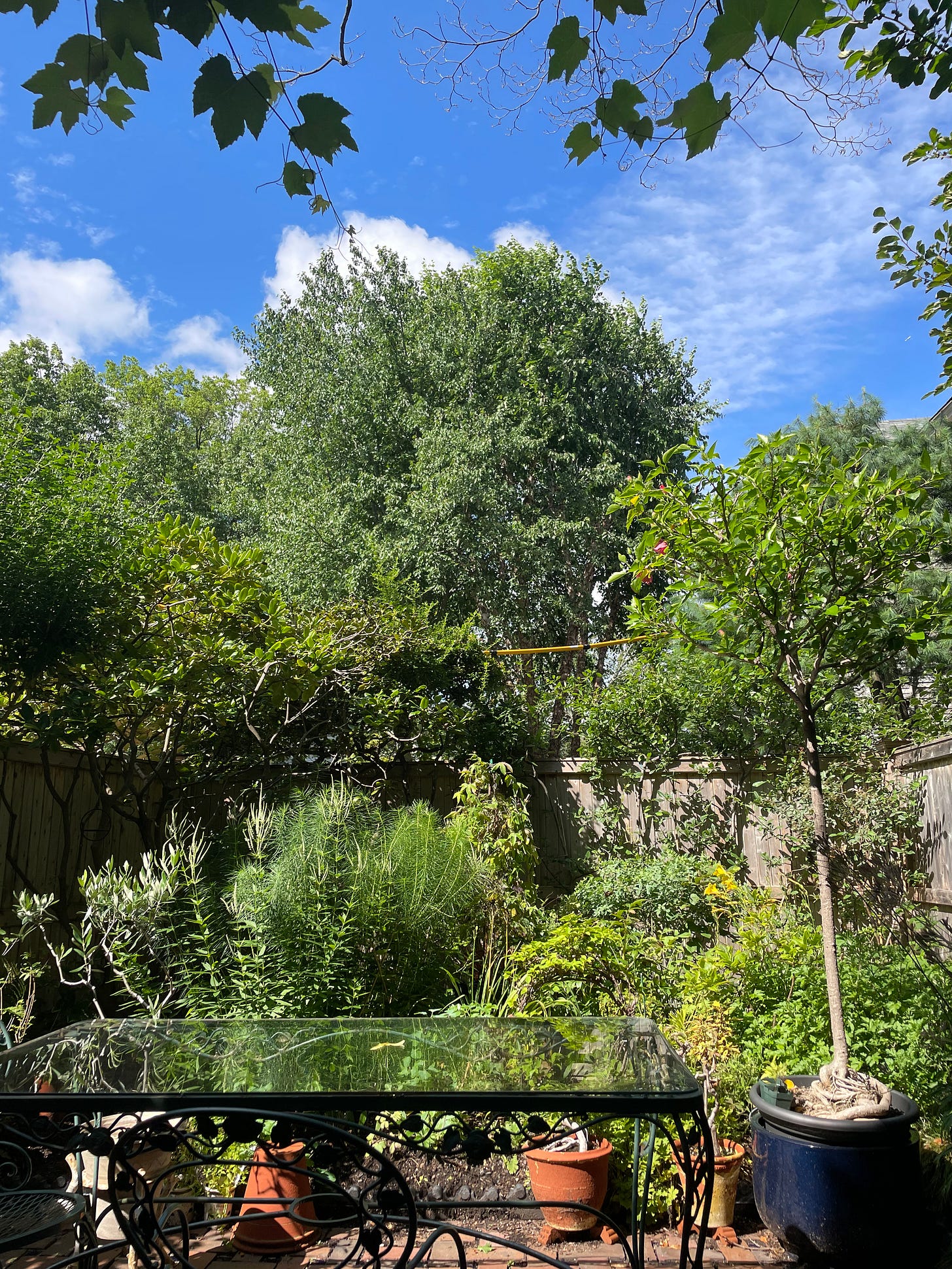It’s high summer, and the soundscape in our little backyard garden is not buzzing.
We have crickets at night – that beautiful pulsing drone. But until nightfall, it’s eerily quiet outside. No bugs. Few birds.
Well, it’s not quiet all day. The current soundscape clock in our neighborhood begins with pickup trucks that arrive between 6:30am and 7am, bringing tradespeople working on house renovations all around us. Real estate development means surround sound construction noise from morning till about 3 or 3:30pm, when the trucks finally pack up and leave.
Peace descends on the neighborhood at that hour. There is little traffic once the trucks are gone. Few arrive home from school or work, cause everyone is having their houses worked on while they are elsewhere in the summer. It’s just us, and the lack of birds and bees.
Until nightfall, when we gain the company of crickets. And occasional whistle of the commuter rail crossing at grade in the distance.
Time was - I mean just some years ago - when a buzzing would accompany August weather here all day. Sitting still in our garden, we could see movement everywhere around us: on the ground, in the air, and on the plants were insects. We cursed them at times. But we didn’t mean to wish them away.
The birds were everywhere as well, despite our housecats prowling about. Woodpeckers with their manic percussion (such crisp attack!). Cardinals, robins, bluejays, and smaller songbirds all of whom – except the jays, squawking – would vacate the area whenever hawks circled near. But then they’d come flooding back as soon as the hawks moved on.
We live across the street from what was a small private bird sanctuary in the nineteenth century, a lot now occupied by a 1960s church instead of a Brahmin ornithologist. But there were so many birds in the neighborhood we always wondered if it was in part a legacy from those Victorian times.
If so, that legacy seems to have come to an end.
I am no scientist. And I am not a seasoned naturalist. I am just a person with a backyard garden who likes to listen to the soundscape. But I know that soundscape has changed. Radically changed.
I would think I was imagining this – or, more likely, that I’ve lost high-end hearing and don’t get as much of the insect buzz in my ears anymore – but real scientists and naturalists are using more objective measurements, and they seem to be noticing the same change. Last week, a new paper published in the journal Ecosphere detailed a decades-long study of a meadow in the Rocky Mountains that measured a 62% reduction in the number of insects present from 1986 to 2020. The Colorado Sun summarized the findings:
“Researchers set up a tentlike trap in the middle of a 27-acre meadow at the Rocky Mountain Biological Laboratory, 9,500 feet above sea level near the abandoned mining town of Gothic. Surrounded by the peaks and meadows of the Elk Mountains, the setting is stunning — and far removed from intensive agriculture, urban growth, pesticide use and other human activities that have been blamed for insect declines… Since 1984, researchers have captured and recorded data about the insects every week of every subalpine summer for 40 years… The researchers documented a 62% decline in the number of insects captured and a 49% decline in their total weight over the period.”
And just as in our little micro backyard meadow in Cambridge, Massachusetts, the decline in insects has been accompanied by a decline in birdlife.
“In 2019, researchers reported an alarming 29% decline in North American birds, a net loss of 3 billion birds, since 1970. Birds that feed on insects were a prominent portion of those losses. Around the Rocky Mountain Biological Laboratory, researchers have likewise documented a striking decline in white-crowned sparrows, an insect-eating bird whose distinctive call is heard less often than in past years.”
I put my phone down on the glass table in our garden, and look at my feet in sandals. There are no ants crawling on them. Truck doors and tailgates are slamming. It’s another morning without bugs. Or many birds. The cats are chasing shadows.
Listening to: I Am Not There Anymore, by The Clientele
Cooking: Naengmyeon (cold noodles in cold soup)




Thanks for this, Damon. Your post resonates. I hadn't stopped to realize that we haven't heard the cicadas here in Madison Wisconsin yet. They usually buzzing by the end of July and it's early August now. We, too, live in a bustling downtown area with lots of unnatural, urban sounds. But there are still plenty of pleasant, wild sounds in the air — birds, crickets, chipmunks. And don't forget the trees! I appreciate the reminder to listen closely and pay attention. I hope you're well!
Yes. Just got back from my childhood home, one range west of the Elk Mountains, and though there were birds and insects, their sound and presence felt far more thin. It was unnerving.